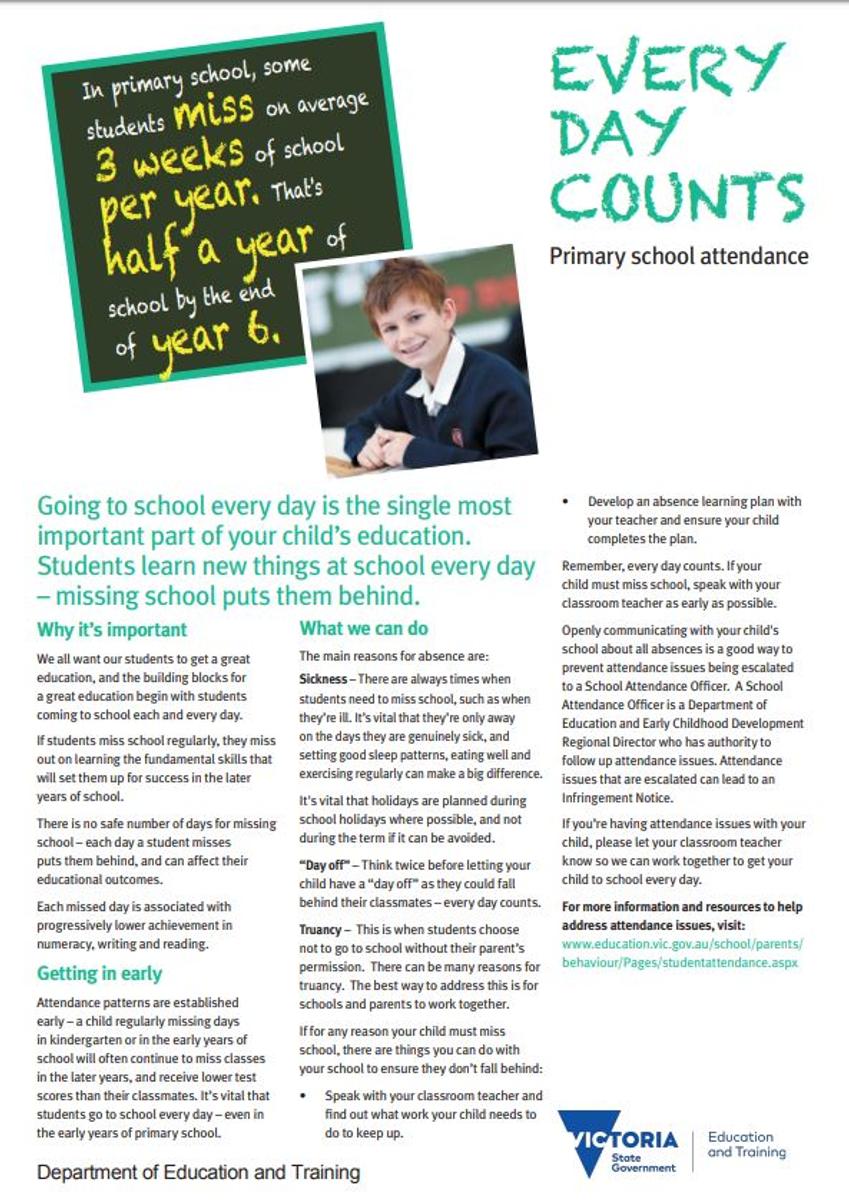Assistant Principal's Report Katrina Spicer - Welfare and Wellbeing

25th October, 2019
ATTENDANCE
Why going to school is important
Going to school every day is the single most important part of your child’s education. Students learn new things at school every day. Attending and participating in school will help your child develop:
- Important skills and knowledge to help them learn
- Social and emotional skills such as good communication, resilience and team work.
Children who attend school every day and complete year 12 have:
- Better health
- Better job opportunities
- Higher income across their lives.
There is no safe number of days for missing school. Every day of school that a student misses out on, puts them behind.
It’s the law that children 6 to 17 years old go to school or be home schooled. As a parent or guardian, you are legally responsible for making sure your child goes to school every day.
If your child misses a lot of school
Every day of attendance counts. If your child misses 15 days (three weeks) of school each year, that is the equivalent of half a year of school by the end of year 6.
What to do if your child can’t go to school
Notify the school by submitting your child’s absence on Compass. This information is directly communicated to the class teacher via the class roll. If your child is absent for three or more consecutive days or if you are planning an extended absence e.g. family holiday, you must phone the office and provide written notification.
Sickness
It is in everyone’s best interests that sick children stay at home. Sick students cannot function well at school and they often carry germs that are contagious and can affect the health of other children and adults in the school. If a child has been vomiting, they must stay at home for at least 24 hours after vomiting has ceased.
Appointments
It is preferred that appointments such as medical/dental etc be made outside school hours, however the school understands that this is not always possible. Try to arrange your day so that your child can attend school for part of the day rather than taking the whole day off to attend an appointment.
Family Holidays
Many families like to take extended holidays to visit relatives overseas. It is preferred that families try to plan these holidays to fit around school holidays and not during term time.
If your child is absent without explanation
Our system is set up so that if a student is marked absent on the school roll without a Compass note from parents, the parents will receive a notification that their child is not at school. You will be asked to enter the absence on to Compass. If you believe that you have received an absence notification in error, please contact the school office.
Late arrivals
Class rolls are marked at 9.00am each morning, therefore if a child arrives late and is not signed in at the office, they may be marked absent. We require that parents sign their children in at the office if they are late for school (i.e. arrive after 9.00am).
Children who refuse to go to school
Some children may refuse to go to school. This is different to truancy, which is when children miss school without their parents’ knowledge.
There are many reasons why a student may refuse to go to school, including:
- Bullying
- Feeling lonely or not having friends
- Falling behind in their work
- They don’t like their subject, teachers or other students
- Illness or mental health issues
- Disability
- Behavioural issues
- Bad sleep habits
- Learning is not encouraged at home
- Relationship issues
- Cultural differences between home and school
It can be normal for children to go through a stage where they struggle with school refusal. It is important to find out why they don’t want to go to school speak to them about what’s happening. Then work with them to find solutions. Speak to your child’s teacher or Mrs Spicer, the Assistant Principal for Welfare and Wellbeing.
Tips to help improve your child’s attendance
- Talk to your child about school and how important it is. You can ask them how they feel about school, what they liked, and if there are any problems.
- Reward good behaviour and not bad behaviour. For example, if your child refuses to go to school, do not let them stay home and just play on their gaming device all day!
- Set a good example. Show them how you keep to your own commitments.
- Encourage your child to take on hobbies that your child enjoys such as sports and clubs. This will help them develop positive relationships outside of the classroom.
- Have a set time to do homework and go to bed.
- Remove all technology from their bedroom
- Pack their school bag the night before with everything you need
- Have a set time for breakfast
- Plan to meet up with a friend so they can travel to school together.
Katrina Spicer
Assistant Principal - Welfare and Wellbeing

